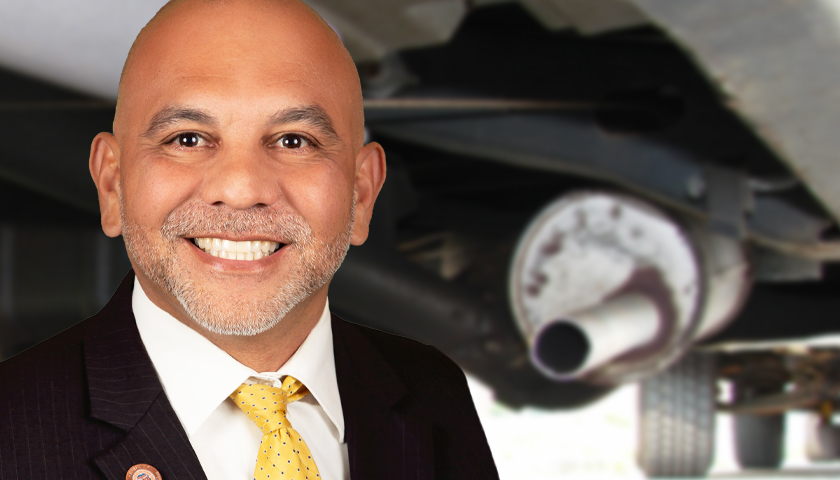The theft of catalytic converters has become a big problem in Arizona, and State Representative Diego Espinoza (D-Tolleson) is sponsoring legislation to expand the law against it. Current law only prohibits buying or selling a used catalytic converter outside regular transactions; HB 2652 goes beyond that to make it illegal to possess, solicit, or advertise a used catalytic converter outside regular transactions. It would also mandate reporting sales to DPS and tracking.
HB 2652 looks very likely to pass, as 49 members of the House voted for it and only 10 Republicans voted against it. It passed the state Senate Committee on Transportation and Technology 9-0 and is now headed for the Senate Rules Committee.
State Rep. Jake Hoffman (R-Queen Creek), one of the legislators who voted No, told the Arizona Sun Times, “The legislation was too broad and too invasive. Our nation’s founding documents make it clear that government’s job is to protect the rights of the people, yet this bill infringes on individuals’ property rights and places a tremendous burden on individual citizens. I can appreciate the intent of this legislation; however, it is, at its core, an overreach by government that will inadvertently criminalize lawful citizens.”
Auto owners who purchase them would be required to submit a notice to the Arizona Department of Public Safety. Mechanics would be required to track the removal of them, and scrap dealers would be required to show proof of registration on a free theft notification website where law enforcement sends descriptions of stolen items.
Additionally, the law would prohibit handymen and others who perform auto mechanic work merely on the side, who don’t have official auto repair businesses, from performing any work related to catalytic converters.
There was a 6,500 percent surge in thefts of catalytic converter thefts in Phoenix in 2021. In 2020, there were 72 thefts reported, up from 19 in 2019. In 2021, that increased to 4,714 cases. This has deluged the understaffed Phoenix Police Department. Most catalytic converters are stolen by drug addicts.
Catalytic converters emerged as an addition to cars in 1975. They convert harmful pollutants into less harmful emissions before they leave the car’s exhaust system. And without them, the car sounds like it’s running rough. Manufacturers use platinum, palladium, or rhodium to make them. These precious metals have increased greatly in value in recent years, with the value of rhodium especially soaring. According to the National Insurance Crime Bureau (NICB), recyclers pay $50 to $250 per catalytic converter.
David Glawe, president and CEO of NICB, said, “Removing a catalytic converter takes only minutes using some basic, readily available, battery-operated tools from a local hardware store.” Replacing a stolen one costs drivers $1,000 to $3,000. Some people are installing a metal cage around theirs or etching their VIN number on it. The Phoenix Police Department posted a list of precautions auto owners can take, such as parking in well-lit areas.
Catalytic converter thefts are rising all over the country. Virginia recently passed a law making breaking, injuring, tampering with, or removing a catalytic converter a class six felony. On the federal level, Rep. Jim Baird (R-IN-04) introduced the Preventing Auto Recycling Thefts (PART) Act in January. It marks identifying information on catalytic converters, addresses how the parts are purchased, and strengthens the enforceability of catalytic converter theft for local law enforcement officers.
– – –
Rachel Alexander is a reporter at the Arizona Sun Times and The Star News Network. Follow Rachel on Twitter. Email tips to [email protected].
Photo “Diego Espinoza” by Arizona State Legislature and “Catalytic Converter” by Seth Sawyers CC BY 2.0.








